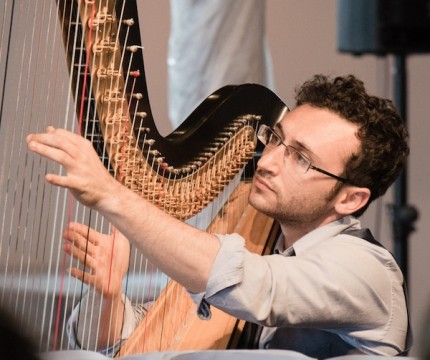Contempo showcases bracing new works by young composers

Contempo, the University of Chicago’s durable new-music series, did again what they do best Friday night at the Logan Center, providing first-class musicians for the performance of contemporary works. “Tomorrow’s Music Today” a subset of the series, featured absorbing music by five U of C doctoral candidates.
The first piece, lament, by Brazilian-American Igor Santos was a short, moving work performed by the celebrated sextet eighth blackbird, Contempo’s artists-in-residence. More a series of sonic gestures, the music conveys a downward descent and atmospheric, gently rocking moments provided by cello, violin and flute. The work closes in a sorrowful conclusion with the piano electronically supplemented by a second keyboard.
Etyydi, by Timothy Page, an American composer with strong Finnish associations, is scored for the traditional pairing of violin and piano, performed by Austin Wulliman and Lisa Kaplan. The seven-minute piece begins with the two instruments at an equal level with the more dramatic and chordal piano being matched by the violinist’s foot-stomping and slim but rhythmic sonics. The piece moves forward to a cadenza-like section for the violin and ends abruptly.
The most substantial work of the evening was by the American Phil Taylor, an everywhere of silver. This 30-minute work is characterized as a harp concerto by the composer. The title comes from a poem of Emily Dickinson and the solo harp seems to represent the poet’s work which the composer describes as evoking “overwhelming vastness and ubiquity.”
It is in two large-scale movements. The harp provides a kind of narrative, which enters and dominates the proceedings as in a traditional concerto, playing against solo and orchestral passage work, leading to a resounding conclusion to the first part.
The second movement begins forebodingly and exhibits a dramatic intensity throughout. There is a richness to the orchestration but the harp still dominates with virtuosity standing out over the aggressive and percussive ensemble. A harp cadenza signals the conclusion and the piece ends on a resonant tone.
The harpist was the astounding Ben Melsky, who brought virtuosity and elegance to his solo role. The fine chamber ensemble, consisting of strings and percussion with flute, horn, clarinet and celesta, was conducted by Cliff Colnot.
The brief (six-minute) bocekce (insect polyphony) by the Turkish composer Alican Camci is an intriguing collection of harmonized, serialized and deconstructed sounds provided by the instrumentalists of eighth blackbird, for whom the work was written. After a lot of metallic chatter it ends amusingly on a sudden “pop.”
The final work of the evening, On Love by the Argentine-American composer Tomas I. Guelglio-Saccone is a triptych based loosely on Romeo and Juliet. The small instrumental ensemble, conducted by Colnot includes a soprano (the sweet-voiced Amanda DeBoer Bartlett) and two actresses (Paloma Nozicka and Cruz Gonzalez-Cadel) who recite every line in the play containing the word “love.”
While the spoken element seems a bit forced, the music is touchingly harmonic. The sung vocalizing is integral to the instrumentation which includes solo work from harp (Melsky on a smaller instrument), flute (Tim Munro), violin (Wulliman) and a finale includes a lament which seems to portray the death of Juliet.
Posted in Performances




